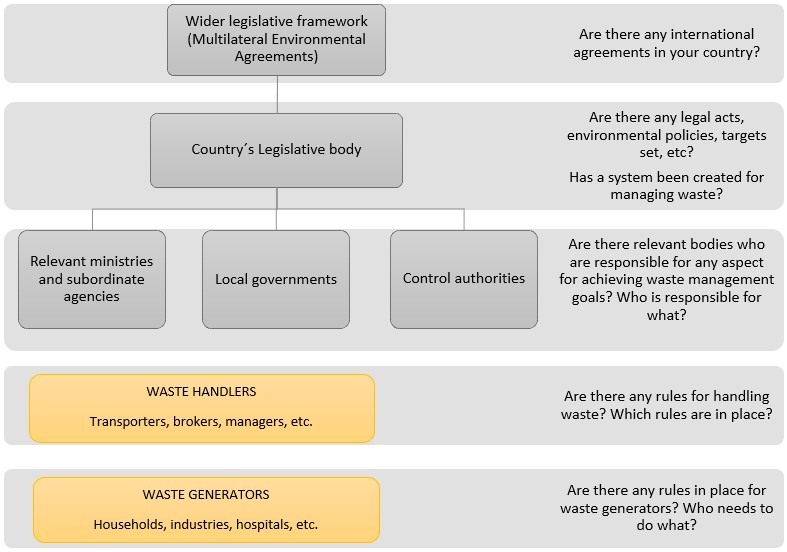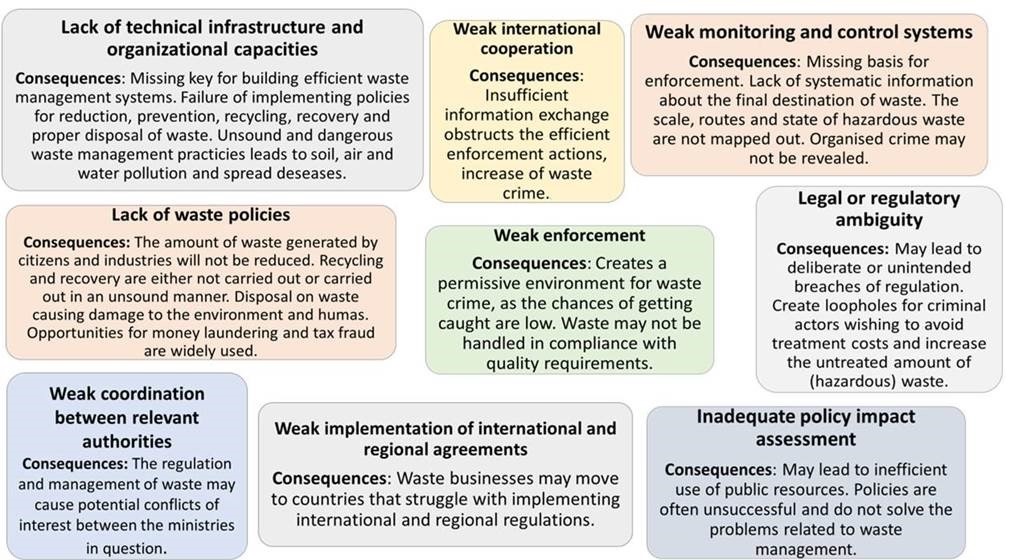MOOC: Auditing waste management
3.1. Waste management actors and governance problems
Organizational structure [Ref 6]
The organizational structure for waste management varies considerably from country to country, but most of the systems have certain functions that need to be fulfilled. For an auditor, it is necessary to map out the appropriate authorities in order to identify the relevant entities that should be audited. As one of the first tasks of an auditor, the responsible government bodies and the nature of the accountability relationships between the actors should be identified (see also Figure 14).
Legislative bodies (parliament and federal parliament)
Most countries have a legislative body responsible for formulating environmental policies and enacting relevant laws. Besides national considerations, international agreements provide directions for national legislative work.
Relevant government departments and other government authorities
In many countries one government authority (ministry, department, agency etc.) is responsible for all environmental policies at the federal or national level, including the management of waste. In other countries, several ministries or other authorities are responsible for different parts of the waste management system. In these countries it is important to map the actors and their responsibilities in order to identify which aspects of the policy each institution is responsible for and how they coordinate their work.
The relevant institution (or institutions) are responsible for several important functions. In some countries these functions are carried out by subordinate agencies. The important consideration here is whether the highest governmental authority (the ministry or other authority) has an overview of activities and makes sure they are performed well.
Local governments
The role of local governments in waste management activities and responsibility varies greatly between countries. In some countries, responsibility for waste management (especially municipal solid waste management) lies entirely with local governments. Alternatively, this may be divided between central/federal government and local governments.
Local governments can be responsible for organizing the collection and recycling of waste or for collecting tax to help fund waste management. Local governments can apply rules for waste management and approve waste management plans.
Control authorities (government level, regional level and local level)
Many countries have an authority responsible for controlling pollution and for inspecting and monitoring the environment and activities that have an impact on the environment. In these cases, it is necessary to map out the role it plays in the waste management system. If such an agency does not exist, the SAI should identify the actors performing these functions. If these functions are not discharged, it may be the responsibility of the SAI to inform the appropriate authorities.
Depending on the type of waste, the authorities that administer or regulate the waste may be at the regional or provincial level or at the local or municipal level. All actors should be mapped out, even though some may fall outside the SAI’s auditing mandate.
Waste handlers/operators
The most typical waste handlers should be identified without going into great detail. In most cases, specialised companies owned by (or acting on behalf of) the authorities are responsible for handling waste from collection to disposal. The activities of these actors may produce social costs in terms of health and environmental risk. It is therefore essential for outside evaluators to ensure that the service is provided in a fair, effective, efficient and environmentally sustainable manner. Control authorities should have an overview of the commercial companies and traders involved in waste management.
Waste generators/producers
Almost every human activity produces waste. Waste generator/producer is anyone whose activities produce waste. Understanding the role of waste generators/producers is very important because waste can be prevented, or the amount of waste reduced, solely by their actions. Effective recycling and reuse of waste depends largely on the correct collection and sorting practices of waste generators.
The behaviour of waste generators is strongly related to their awareness and attitudes. It is very important to keep raising public awareness of sound waste management and to provide information (see also Module 2).

Figure 14. Actors in the waste management chain.
Source: National Audit Office of Estonia
 AUDIT CASE: MAPPING ACTORS
AUDIT CASE: MAPPING ACTORS
| Brazil – Mapping relevant waste management policy actors SAI Brazil audited the governance of the Brazilian national waste management policy in the period of 2015-2016. The national waste management policy foresees that all levels of government as well as the private sector should work in mutual collaboration to achieve the goals of the policy. One of the challenges for auditors was to map relevant waste management policy actors as Brazil is a big federal country with three levels of government – national sub-national and local governments. Interviews and documental analysis were made to identify the most important actors and the SAI of Brazil consequently decided to focus on national actors in charge of policy coordination. Lack of participation of local and sub-national actors as well as the private sector and civil society in the waste management committees – vital for implementing the national waste management policy – was one of the findings of the audit. |
 THINKING EXERCISE
THINKING EXERCISE
Draw an actors map based on your country-specific situation. What is similar and what is unique compared to other countries in your region?
The INTOSAI WGEA guidelines also list and describe numerous governance problems related to waste management (Figure 15). You may wish to bear these in mind while going through the next sub-chapters of this Module. This will help you to think about audit questions that are relevant to your country.

Figure 15. Possible governance problems []
 AUDIT CASE: WASTE MANAGEMENT MONITORING AND CONTROL
AUDIT CASE: WASTE MANAGEMENT MONITORING AND CONTROL
| Morocco – Waste management monitoring and control systems SAI Morocco has issued various audit reports on the management of household waste. The following video case has been put together based on the observations and recommendations from these reports, with a focus on problems related to waste management monitoring and control systems. |
 AUDIT CASE: WASTE MANAGEMENT INFORMATION SYSTEM
AUDIT CASE: WASTE MANAGEMENT INFORMATION SYSTEM
| Croatia – Role of the waste management information system in monitoring activities SAI of Croatia conducted an audit of the implementation of the activities of bodies responsible for the establishment of waste management system in the Republic of Croatia. One of the audit questions also covered the quality of the waste management information system. Waste Management Strategy foresees the waste management information system as one of the conditions for an effective functioning of the waste management system in Croatia. For example, the information system is important for the monitoring of the implementation of waste management. As one conclusion of the audit, regarding the waste management information system, SAI Croatia recommended that responsible authorities/competent bodies should provide the information needed to run the information system. SAI Croatia also recommended to take measures to improve the quality and reliability of data in order to achieve more effective control over the waste management system at all levels. |
 AUDIT CASE: WEAK COORDINATION IN SOLID WASTE RECYCLING
AUDIT CASE: WEAK COORDINATION IN SOLID WASTE RECYCLING
| Kuwait – Evaluating the efficiency and effectiveness of solid waste recycling projects In 2016, SAI Kuwait published an audit related to solid waste management and recycling projects. Among other things, the responsibilities of all government entities involved in the process of solid waste treatment projects as well as their inter-relations were reviewed. SAI Kuwait identified that the existence of administrative and regulatory obstacles preventing coordination between the entities involved would result in a risk of delay of solid waste treatment projects causing these to not meet their objectives. Moreover, auditors detected that the funds allocated for the projects had not been used properly within the periods planned. As a result, State Audit Bureau recommended that a more effective way of communication and coordination would need to be found in order to enable successful implementation of the solid waste treatment projects |


 AUDIT CASE: MAPPING ACTORS
AUDIT CASE: MAPPING ACTORS THINKING EXERCISE
THINKING EXERCISE